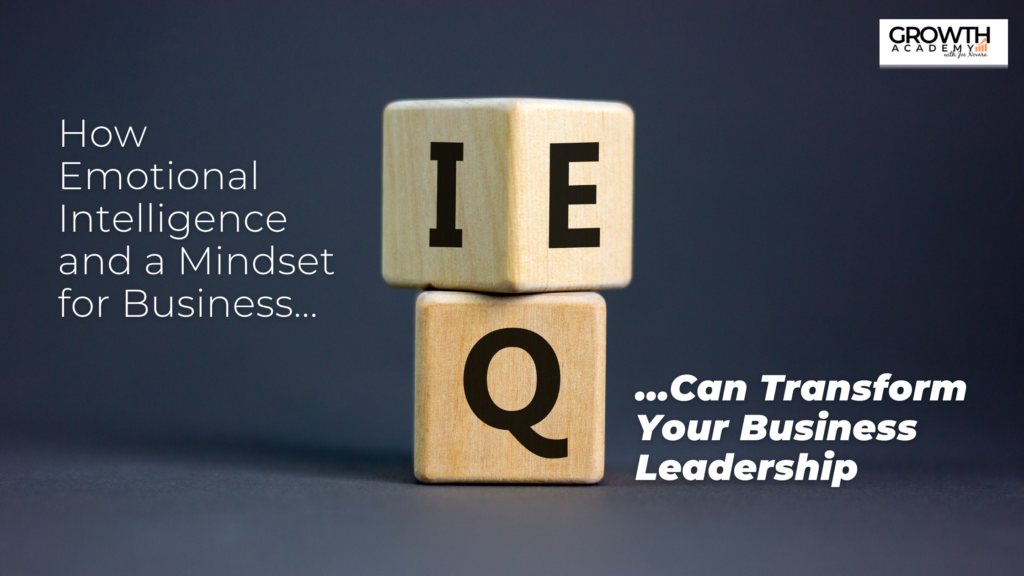How Emotional Intelligence and a Mindset for Business Can Transform Your Business Leadership

Today we know more than ever about how our mindset, emotional intelligence, and ability to connect with others contribute to our success as business owners.
Take Hallie, for example. She’s an estate planning attorney with a small team. One of her trust-fund clients left a negative review that at first had her scratching her head. Hallie knew she wanted to reach out to the client, but before she did, she called her staff together. “What went wrong?” she asked, inviting their responses while she listened.
Together, they analyzed their work with the client from start to finish, discovered some glitches in their process, and developed a plan to avoid similar mistakes in the future. As a result of that conversation with the team, Hallie knew exactly what to say when she called the client.
This is great example of why it’s so important to address the emotional and psychological aspects of leadership. Hallie led her team well and avoided a crisis of morale. She listened to her staff, took their input into consideration, and worked collaboratively with them to develop a plan for the future. Her calm demeanor and empathetic approach resolved the immediate situation and strengthened team trust and morale. Had she reacted differently, accusing staff members of mistakes without taking the time to listen to their input, the outcome could have been much different.
When we go beyond strategy and execution to understand deeper issues affecting our leadership, we can perform as Hallie did in this situation — at a higher level in our businesses and lives.
Let’s take a closer look at the role of emotional intelligence in leadership, the impact of our mindset on our businesses, and how both contribute to our ultimate success.
What Is Emotional Intelligence in Leadership?
“Emotional intelligence, a different way of being smart, is a key to high performance at all levels, particularly for outstanding leadership. It’s not your IQ; it’s how you manage yourself and your relationships.” – Daniel Goleman
Goleman focused on four domains of emotional intelligence (EI):
- Self-Awareness
- Self-Management
- Social Awareness
- Relationship Management
When we’re self-aware, we manage ourselves and our emotions more effectively. When we’re socially aware, we’re better at building relationships. As business leaders, how we manage ourselves and our relationships determines how effectively we’ll lead.
Let’s go back to the story of Hallie. She carefully managed her emotions while also navigating the interpersonal relationships with her team empathetically. In doing so, she built trust, strengthened her team, and effectively managed a challenging situation.
That’s the role of emotional intelligence in leadership. Not only does it help leaders build meaningful connections with their teams, but it also allows for better conflict resolution and decision-making. And it creates a positive and productive work culture.
Some other examples of emotional intelligence in leadership include:
- A manager who remains calm under pressure and reassures the team during a crisis.
- A business owner who actively listens to employee concerns and takes steps to address them.
- Leaders who adapt their communication style to fit the needs of different stakeholders.
The importance of emotional intelligence in leadership cannot be overstated. Leaders with high emotional intelligence can inspire loyalty, boost morale, and drive organizational success. By prioritizing emotional intelligence, leaders create an environment where employees feel valued and motivated.
“It’s not leadership by position that allows people to succeed; it’s the capacity to influence the thoughts, the feelings, the emotions, and the actions of other human beings.” – Tony Robbins
Mindset for Business and Leadership Success
In addition to emotional intelligence, cultivating the right mindset for business is necessary for success. The mindset of business owners, entrepreneurs, and leaders significantly impacts how they approach both challenges and opportunities.
I was selling real estate in New York when the twin towers fell in 2001. I watched the second plane crash into the second tower and then witnessed both buildings collapsing. You don’t live through an experience like that and then go on as if nothing happened. I tried. It didn’t work. A few months later, I was depressed and angry, barely able to get up in the morning much less show and sell homes.
The mindset for business I’d developed as a successful New York City realtor tanked. I was running on empty and struggling with PTSD. Thankfully, I still had connections in the printing industry and was able to go back to working for someone else for a while. I needed the structure while I recovered.
What’s a Mindset for Business?
In the face of unthinkable circumstances, I learned I hadn’t developed my business mindset well enough. But what is a mindset for business?
First off, it’s a growth mindset. The most successful business leaders I know are always learning, always growing, and always doing what it takes to get better at what they do. A growth mindset helps us view setbacks as opportunities for improvement. It also builds resilience, giving us the ability to face challenges with determination and adaptability.
In the wake of 9/11, I lost the ability to adapt and keep moving forward. Going back into a work environment where I had other team members around me was just what I needed to rebuild my resilience so I could go out on my own again six years later.
A mindset for entrepreneurs and business owners is also innovative and solution oriented. Focusing on solutions doesn’t mean ignoring problems. It means keeping your eyes open for the solutions to present themselves. It’s staying positive, flexible, and ready to innovate to create the solution you’re looking for.
A mindset for leadership and business also prioritizes vision, collaboration, and long-term thinking. When you’re keeping your vision for your business front and center, you’re empowered to inspire and guide your team.
How to Cultivate a Winning Mindset for Business
If you’re not sure how to keep your mindset positive and motivated for growth, try some of these practices:
- Practice self-reflection to identify limiting beliefs and replace them with powerful mantras that keep you focused on solutions.
- Set clear goals and focus on the progress you’re making.
- Surround yourself with others who are like minded and supportive, so you’re challenged and held accountable for taking action that’ll lead to growth.
Integrating Emotional Intelligence and a Mindset for Business
You may be wondering how to become the leader your business needs you to be. Integrating emotional intelligence with a strong mindset for business is a good place to start. Try these practical steps and let me know how it goes:
- Develop Self-Awareness: Regularly assess how your emotions influence your decisions and interactions. Journaling or seeking feedback from a business coach can help.
- Prioritize Empathy: Actively listen to your team, clients, and stakeholders. Acknowledge their emotions and perspectives without judgment.
- Embrace Continuous Learning: Adopt a mindset of lifelong learning to stay adaptable and open to new ideas. Hint: Attend the next Total Business Breakthrough for an instant boost of learning and motivation!
- Seek Coaching or Mentorship: Work with a business coach who can help you refine your emotional intelligence and leadership approach. Growth Academy Coaching has a couple of open spots.
- Invest in Self-Care: Your mental and physical well-being directly impact your ability to lead effectively. Prioritize activities that recharge and ground you.
Our level of emotional intelligence and our ability to keep our mindset for business strong and positive both impact our business success. When we invest in ourselves, cultivating greater emotional intelligence and strengthening our growth mindset, we as leaders can create lasting impact… for our businesses, our team members, and our communities.
If you’re ready to develop stronger emotional intelligence and mold your mindset for business, reach out to the team at Growth Academy Coaching. We’ll meet you where you are with customized approaches that go beyond in-the-box business coaching.




